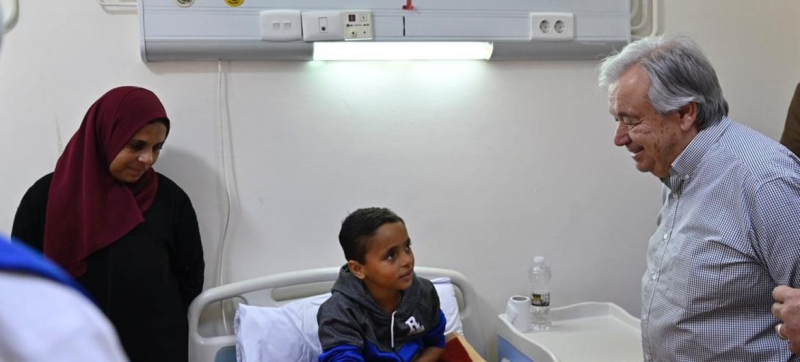
During his visit to the Middle East, the UN chief visited a hospital in the Egyptian city of El-Arish, where refugees from Gaza are being treated. UN chief: decision to deny UNRWA access to northern Gaza is unacceptable Humanitarian assistance
On Monday, UN chief Antonio Guterres, visiting Jordan, renewed calls for a permanent cessation of fighting in Gaza and the release of all remaining Israeli hostages.
Speaking in Amman at a joint press conference with Jordanian Foreign Minister Ayman Safadi, the Secretary-General pledged to continue to push for “the removal of all obstacles to life-saving assistance, increased access and more entry points” into the Gaza Strip.
The UN chief’s address came against the backdrop of a dire humanitarian situation in the enclave, especially in its northern regions. The World Health Organization (WHO) reported that 27 children in Gaza have died from complications related to severe malnutrition.
“We must face the facts. There will be no sustainable humanitarian solution to an ongoing bloody war,” the UN chief stressed. “nothing justifies collective punishment of the Palestinian people,” he added.
UNRWA cannot deliver aid to northern Gaza
Meanwhile, the UN Agency for Palestine Refugees in the Near East (UNRWA) confirmed that Israeli authorities had banned it from delivering aid to northern Gaza. However, UNRWA reported that basic goods, including food, in these areas are now 25 times more expensive than before the war.
“The decision to prevent UNRWA convoys from passing into part of the Gaza Strip, where there is a dramatic famine situation, is completely unacceptable. And those who made this decision must take responsibility by facing the consequences of this decision on the dramatic situation of the people in the northern Gaza Strip, where, as I mentioned, children are already dying of hunger,” the Secretary-General said in response to questions from journalists.
UNRWA noted that during the first 23 days of March, an average of just 157 aid trucks per day entered Gaza. According to UNRWA, this is well below the checkpoints’ capacity and target of 500 trucks per day. Delays continue to occur at the Kerem Shalom crossing on the Israeli side and at Rafah on the Egyptian side, the UN says.
Help and hope for millions
Previously, the UN Secretary-General also recalled that UNRWA has a positive impact on the lives of millions of people.
“We must strive to ensure that the unique services provided by UNRWA continue to be provided because it gives hope to [the people],” he said after meeting with residents of the Wihdat camp in Jordan, where tens of thousands of Palestinian refugees live.
Guterres stressed that UNRWA remains a “lifeline” for many. In addition to providing direct humanitarian assistance to half a million of the poorest Palestinians, UNRWA provides education, health services and job creation to hundreds of thousands of Palestinian girls and boys.
Visit to Rafah
Describing his visit to the Rafah border crossing over the weekend, the UN Secretary-General said that aid workers people he met said they had “never seen anything more terrible” than what was happening in the Gaza Strip. this must stop,” the UN chief said, adding that a two-state solution is the only way to ensure a lasting end to the Israeli-Palestinian conflict.
Read also:
Ramadan and solidarity visit: UN Secretary General visits Rafah checkpoint on the Egypt-Gaza border
“Israelis must see their legitimate security needs materialized and the Palestinians must see their legitimate aspirations for a fully independent, viable and sovereign state realized in accordance with United Nations resolutions, international law and previous agreements,” Guterres said.
New raids on hospitals
WHO Director-General Tedros Adhanom Ghebreyesus expressed deep concern over reports that that Israeli forces “besieged and attacked” Al-Amal Hospital in the southern Gaza town of Khan Younis on Sunday, killing a Palestinian Red Crescent worker and another person sheltering at the hospital.
“Another attack on the Al-Amal hospital in the Gaza Strip, another situation where patients and health workers are in great danger,” the head of WHO wrote on his page on the X platform.
WHO previously said its team was not allowed to travel to the hospital to assess patients’ needs. On Sunday, media reported that Israeli military equipment had arrived at Al-Amal and Nasser hospitals in Khan Yunis. The IDF has previously justified such raids on the basis of the need to find Hamas militants.
